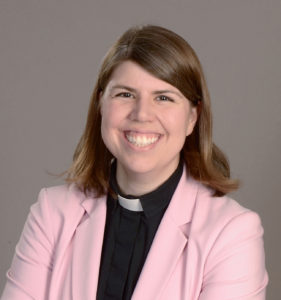by Jeanette Bidne
Jeanette June Bidne. That has been my name since birth. Yet, after marriage I was repeatedly asked, “So, what was your maiden name?” I smile and repeat the exact words, Jeanette June Bidne. My name hasn’t changed. Sometimes I wonder if people have assumptions about me when I share those exact words a second time. If the thought of someone changing their name creates an emotional response (whether positive or negative), then you know this truth, names matter. You know that names and their use have power.
 Name is essential to marriage, self-discovery, life changes, or welcoming a new family member. How names are used makes all the difference in the world. When my husband and I were preparing for marriage, I recall my husband telling me about a conversation he shared during a pastoral visit (we are both clergy). The topic was about whether I would change my name once we were married.
Name is essential to marriage, self-discovery, life changes, or welcoming a new family member. How names are used makes all the difference in the world. When my husband and I were preparing for marriage, I recall my husband telling me about a conversation he shared during a pastoral visit (we are both clergy). The topic was about whether I would change my name once we were married.
During this visit, he was told that a woman not changing her name showed a “lack of commitment” to the relationship. Now take a breath; this is what he was told, and not our reality! My dear husband-to-be was wise enough to offer, “Then what about the tradition of men not changing their names when married?” I think the conversation shifted rather rapidly after his response. We chuckle about it now. Behind the not-so-benign comment was the truth that names say something about us.
What’s my name?
As a voting member at the ELCA Churchwide Assembly last summer, I needed to introduce myself in multiple ways: online, in-person, and via name tag. I remember pausing to consider my different name choices. What’s my name for this event? Do I simply say my name? We are all beloved by God, so do I need to say more? Wait. Should it include my relational title of pastor so my role is known? Should it be formal, using Reverend, out of respect for the office? What about the title of doctor, due to my Doctorate of Ministry degree? Would including my degree seem prideful and be misunderstood? A simple name tag becomes a statement of who we are and how we wish to be in a space. And we understand that others in that space will bring their history and beliefs about names to it.
This Easter, I think of Jesus at the tomb in the Gospel of John. Mary Magdalene is in the garden, weeping; the body of her Lord is not in the tomb. Someone is speaking to her, and she seems distraught. But the moment she hears her name, in the familiar voice of her teacher, she turns. The voice who had spoken healing to her and set her free earlier in the Gospel now changes the world in which she stands. The empty tomb is not another blow of sadness but the resounding cavern of resurrection! In the word “Mary,” a new world is created for a person submerged in grief; there is now a world where death does not have the last word. A world where healing can continue and spread, and there is hope when all seems lost. She stands in a world where God saw suffering and called out to end it.
Each of us could share a name story. Perhaps it is a nickname we hold dear or the sense of acknowledgement we feel when we are addressed by a name which resonates with us. Maybe your name story reflects a change in the names you use or how names evoked a change in you. As people of God, I feel the latter is especially true. Names matter and names can bring change. The names which arise from being a follower of Jesus matter. Child of God. Disciple of the way. Bearer of peace. Body of Christ. The list is extensive. These names are declared to us and they can change our world. As we go into the world, we bear the names God gives us and we too are invited to voice names which a hurting and broken world needs to hear. Names of peace. Names of hope. Names of acknowledgement. Names of reconciliation. What names will you speak into this day?
 The Rev. Dr. Jeanette Bidne serves Trinity Lutheran Church of Blue Earth, Minn. She is a wife, new mom, scrapbooker, crafter and interested in helping people connect Scripture to daily life. She enjoys a good cup of coffee.
The Rev. Dr. Jeanette Bidne serves Trinity Lutheran Church of Blue Earth, Minn. She is a wife, new mom, scrapbooker, crafter and interested in helping people connect Scripture to daily life. She enjoys a good cup of coffee.


I was recently told that use of my maiden name was two letters too long for the engraving on a niche in our columbarium. The committee said I could use initials or have a refund. It was sad to think that my heritage was to be forgotten by the length of my name and the rules of a committee. I, of course, took the refund and my plans are now changed as where I will be buried. It was a hurtful experience after 30+ years of being a member of our church. Thank you for this article.
It would be wonderful to take this topic further — the choice some make to change their name because of a change in identify and self-understanding. Thank you.